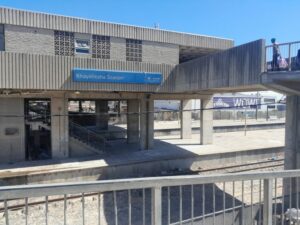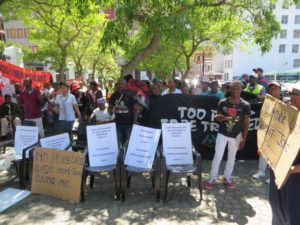
Court interpretation services in the Western Cape have been disrupted since the beginning of the week as court interpreters stayed away from work due to non-payment of the services they rendered, for some as far back as 2023.
About 70 interpreters for local and foreign languages, mainly from the continent, who are employed on a casual basis, have been on strike since Monday. Among their demands is the immediate payment of all overdue claims, compliance with the Labour Relations Act, implementation of a transparent payment system and formal recognition of their role.
After a meeting they had with the Department of Justice and Constitutional Development, French and Lingala intepreter, Hervé Landrey Sibi, speaking on behalf of the striking interpreters, said that the department promised to deal with the issue of overdue payments. They gave the department 14 days to resolve the issue. “Everyone is waiting for their money and some of the overdue payments date back to 2023. So at home, people are hungry and we will be fully satisfied when people have money in their accounts. We have not been given a time frame as to when the department will pay everyone and that is why everyone is unhappy,” he said.
“We have been crying in silence for a long time but this time around we got together both the local language and foreign language interpreters. Many of us have been employed since 2009 as casual interpreters. Our belief is that the Department of Justice which is supposed to uphold the rule of law and protect everyone and the Constitution of South Africa, is against the Labour Relations Act. We are talking about section 198 C and we believe that we are entitled to relief sought in section 198 D of the act,” Sibi said.
Section 198 C of the LRA defines casual workers but also ensures that non-permanent workers are treated the same as permanent workers, while Section 198 D talks about representation of casual workers and dispute resolutions.
Austerity undermines the delivery of justice
Provincial head of the justice department, Rodney Isaacs told Elitsha that the delay in payment of the interpreters’ wages is a result of their insufficient capacity and the few administrative staff members they have cannot cope with the load.
“The reasons for the backlogs is that, first of all, we have a few people in a section called Payroll. There’s more people from around the world here than in any other part of South Africa and due to our cost containment measures in government, we were not able to generally in the department create any more posts.” Isaacs further stated that while the number of foreign nationals appearing in court has increased in the last five years, the administrative staff to process the payment of interpreters’ fees has not changed.
He said that the department came up with a plan to re-allocate resources and to get help from other provinces. The department appealed to the strikers to allow the plan to prove it can work. “One of my colleagues in another province came to the table and said send some claims to us and we will also help you,” said Isaacs.

A map of African language family distributions and migrations within and out of Africa.
Ziphe Douse, who has been working as a court interpreter for 9 years, said “I don’t have a salary date, number one. Number two, I do not have a salary structure whereby they tell me, okay, if you do this, we will remunerate you this much. Number three, I do not have benefits the same as a permanent employee. So permanent employees, as you know, that work with the department, they have medical aid. They have housing allowance, subsidy, all those things, you name it. I don’t have any benefits,” she said.
According to Isaacs, the interpretation services were mostly affected on Tuesday and Wednesday this week, affecting mostly African nationals.

Impact of non-payment on interpreters
Mihlali Mcunukelwa, an interpreter for Afrikaans, IsiXhosa and English started in 2021 said the non-payment of her wages means she is struggling to feed her family. “We come to work everyday and you are expected to do your best even though you have not been paid. You need to make sure that the accused person or the person you are interpreting for gets the right message and we are expected to dress formally even though they still owe us money. We are in debt and cannot pay creditors,” she said.
The last payment she received was in January this year, and that was for work she did in October, November and December last year. “All my creditors have put me under lawyers. The school, I am behind by three months on the school transport, the gym is also behind by three months and my clothing accounts are under lawyers,” said Douse.
Just like Mcukunelwa, Douse was last paid in January.





